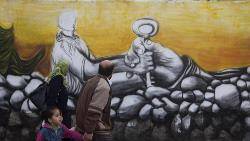Two Palestinians, Mohammad Abu Al Thaher and Nadim Nuwara, were shot dead by Israeli soldiers on Thursday during Nakba Day commemorations near the Israeli military base of Ofer just outside Ramallah.
Palestinians in Israel, the West Bank and Gaza Strip were observing what they refer to as the 'Nakba' or 'catastrophe' that befell Palestinians in the 1948 war.
At noon, an eerie silence fell on the West Bank city of Ramallah as sirens wailed for 66 seconds. Following a march from the late President Yasser Arafat's mausoleum, hundreds stood at the city center.
Alongside a bagpipe-playing marching band and local scout groups, Palestinians, young and old, carried maps of historic Palestine and large metal keys—symbols of their homes lost decades ago, and the right to return to them. Actors, mounted atop a stationary truck, re-enacted scenes depicting the Nakba.
Mohammad Eliyan, who heads the Committee to Commemorate the Nakba, said the Palestinians' right of return to their ancestral homes was key to a just solution to the conflict. “This May 15, as we observe this sad occasion, we say that we are stronger and more determined to stand up to the Israeli government's policies that continue to dispossess Palestinians,” he said.
Similar marches took place in the West Bank cities of Bethlehem, Nablus, Qalqilia, Jenin and Tubas to mark the day. At least five Palestinians, two of whom were later declared dead, were injured by Israeli soldiers in the environs of Ramallah and the southern city of Hebron, as protesters were met with live fire, teargas and rubber-coated steel bullets.
Palestinians also held rallies and remembrances throughout Israel, where they make up 20 percent of the population. At least two people were hurt, and several others arrested, when police tried to disperse a peaceful demonstration outside the Damascus Gate of Jerusalem’s old city.
“The nakba still affects us too,” said Abed Hassoura, a Jerusalem resident holding a portrait of his son Louay, who was jailed three years ago on security offences. “We live here but the state does not see us as equals, it sees us as a threat.”
Demonstrators waved banners that said “return” and “all of Palestine is ours,” and echoed Eliyan’s comments about the right of return. The issue has been a controversial one during decades of negotiations, with Israel insisting that it will not accept more than a token number of refugees. Palestinian President Mahmoud Abbas seemingly renounced it in a 2012 interview with Israeli television, saying that he no longer had the right to live in Safed, the town of his birth.
'Sacred right'
“It’s a right, a sacred right. You cannot ask us to accept a solution if our people cannot return, if maybe we cannot even stay,” said Asmaa Majid, referring to proposals backed by some Israeli politicians that would cede towns with large Palestinian populations into a future Palestinian state.
During the past year, the Israeli government has pushed plans to expel tens of thousands of Bedouin from their land in southern Israel, and to reduce Palestinian representation in the Knesset by raising the electoral threshold. Prime Minister
Benjamin Netanyahu said earlier this month that he would introduce a “basic law,” the Israeli equivalent of a constitutional amendment, declaring the country a “Jewish state.”
“Since the beginning of the current government, with its coalition of right-wing racists, we have been confronted with ‘wars’ on multiple fronts,” Basel Ghattas, a Palestinian member of the Knesset, said on Thursday.
Protests were also planned for Thursday evening in Jaffa, Haifa, and other cities with large Palestinian populations. In the northern city of Akka, residents will hold a remembrance at the home of a woman who faces eviction from her nearly 50-year-old family home.
On Wednesday, the eve of the anniversary, Palestinians clad in black shirts carried 66 torches through the streets of Ramallah. In a statement broadcast on local television later that night, Abbas accused the Israeli government of making the two-state solution more difficult to attain, leaving one of two possibilities: a bi-national state or a racist apartheid regime.
“It is time for the leaders of Israel to understand that there is no homeland for the Palestinians except Palestine, and it is here we are staying,” Abbas said. “It is time to end the longest occupation in modern history.”
In 1948, more than 800,000 Palestinians, or 67 percent of the population, fled or were expelled by force from their homes and prevented from returning.
Figures released by the Ramallah-based Central Bureau of Statistics this week put the number of registered Palestinian refugees at 5.3 million. They live in 58 United Nations-run camps in Syria, Lebanon, Jordan, the West Bank and Gaza Strip.
Fatah leader Marwan Barghouti, imprisoned in Israel on murder charges, said in a written statement that any solution to the Palestinian-Israeli conflict that does not guarantee the right of return is unacceptable.
“The right of return for Palestine refugees to their homes from where they were forcibly transferred is a sacred right that can not be compromised, a right guaranteed by international law and enshrined in UN General Assembly resolution 194,” he said.
In Gaza, dozens of Palestinians demonstrated at the barrier separating the strip from Israel, raising flags and banners in support of the right of return.
"The right of return remains the subject of unanimity among all of the Palestinian people, everywhere," said Zakaria al-Agha, a member of the PLO's executive committee, in a speech in Beit Hanoun, adding that Israel's demand to be recognized as a Jewish state is meant to deprive refugees of that right.
PHOTO CAPTION
Palestinians walk past a mural marking the 66th anniversary of Nakba Day in the Qalandia refugee camp near the West Bank city of Ramallah on Thursday, May 8, 2014.
Al-Jazeera


 Home
Home Discover Islam
Discover Islam Quran Recitations
Quran Recitations Lectures
Lectures
 Fatwa
Fatwa Articles
Articles Fiqh
Fiqh E-Books
E-Books Boys & Girls
Boys & Girls  Articles
Articles










